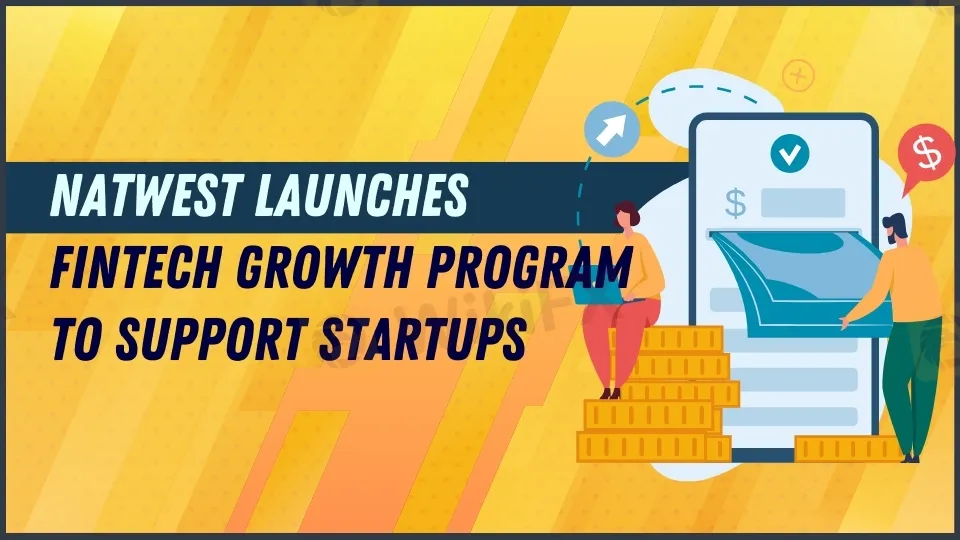简体中文
繁體中文
English
Pусский
日本語
ภาษาไทย
Tiếng Việt
Bahasa Indonesia
Español
हिन्दी
Filippiiniläinen
Français
Deutsch
Português
Türkçe
한국어
العربية
NatWest Launches FinTech Growth Program to Support Startups
Abstract:NatWest unveils a new FinTech Growth Program to help UK startups. The initiative focuses on scaling FinTech companies with resources and expert guidance.

NatWest Announces FinTech Growth Program to Help UK Startups
NatWest, a British bank, has announced the introduction of its FinTech Growth Programme, which will assist developing FinTech businesses in the United Kingdom in scaling up. The initiative, which was launched on December 4, intends to empower emerging businesses with the resources, networks, and experience of a large financial institution. NatWest thinks that this program will boost its own innovation efforts while also aiding the expansion of the innovation economy.
“This program lays a pathway to create better outcomes for our customers,” said David Grunwald, Director of NatWest Innovation. “Working this closely with FinTechs and UK entrepreneurs strengthens our ability to be future-focused while supporting the growth of the innovation economy.”
The program will choose five FinTechs that will focus on addressing important difficulties in the payment industry, which is a chronic issue in today's increasingly digital society. Startups must be situated in the United Kingdom and in the pre-Series A stage. Participants will get access to seminars, mentorship, and coaching sessions over the course of ten weeks to enable them to co-create ideas for banking's future.

This program is part of NatWest's wider effort to collaborate with early-stage FinTechs and entrepreneurs and provide them with opportunities to learn from one another. The small group of startups will be able to network with other FinTechs, learn from experienced coaches, and benefit from NatWest's Innovation department to expand their networks.
Industry analysts have stressed the increasing relevance of bank-finTech collaborations. According to PYMNTS, these relationships are critical to driving the adoption of open banking and overcoming hurdles in creating new products. While banks frequently suffer with out-of-date systems, FinTechs are more nimble and may try new ideas with less regulatory oversight.
“These bank-FinTech partnerships allow everyone to bring what theyre best at to the table,” said Moa Agrell, Senior Banking Relations Manager at Trustly. This means banks may make use of FinTechs' quick innovation capabilities, while FinTechs get access to industry knowledge, regulatory experience, and the trust created by established financial institutions.
According to Agrell, these collaborations may benefit all parties involved: “It can be a win for the bank, a win for merchants, a win for consumers, and a win for the industry overall.”
Meanwhile, as reported earlier this week, the Federal Deposit Insurance Corporation (FDIC) is considering new rules that may affect such partnerships.
Final Thoughts:
NatWest's FinTech Growth Program promotes innovation and helps UK firms develop. FinTechs may promote financial sector advancement by combining their skills and resources with those of a large bank. As bank-FinTech partnerships expand, they have the potential to transform the future of banking and financial services, benefiting businesses, consumers, and the economy as a whole.

Disclaimer:
The views in this article only represent the author's personal views, and do not constitute investment advice on this platform. This platform does not guarantee the accuracy, completeness and timeliness of the information in the article, and will not be liable for any loss caused by the use of or reliance on the information in the article.
Read more

SEC Approves Hashdex and Franklin Crypto ETFs on Nasdaq
The SEC has approved crypto index ETFs by Hashdex and Franklin Templeton, including Bitcoin and Ethereum, marking a milestone in crypto asset investment.

North Korean Hackers Steal $1.3bn in Cryptocurrency in 2024
Over $2.2bn in cryptocurrency stolen in 2024, with North Korean hackers accounting for $1.3bn. Discover how cyber theft impacts the evolving crypto landscape.

ASIC Sues Binance Australia Derivatives for Misclassifying Retail Clients
ASIC accuses Binance Australia of misclassifying 500+ retail clients as wholesale, denying key consumer protections for crypto derivatives. Penalties and reforms are underway.

Revolut Leads UK Neobanks in the Digital Banking Revolution
Revolut dominates the UK neobanking scene with 15.6M downloads in 2024, surpassing traditional banks. Explore how innovation drives this fintech leader’s growth.
WikiFX Broker
Latest News
Geopolitical Events: What They Are & Their Impact?
Top 10 Trading Indicators Every Forex Trader Should Know
ASIC Sues Binance Australia Derivatives for Misclassifying Retail Clients
WikiFX Review: Is FxPro Reliable?
Malaysian-Thai Fraud Syndicate Dismantled, Millions in Losses Reported
Trading frauds topped the list of scams in India- Report Reveals
Why Do You Feel Scared During Trade Execution?
WikiFX Review: Something You Need to Know About Markets4you
Revolut Leads UK Neobanks in the Digital Banking Revolution
Fusion Markets: Safe Choice or Scam to Avoid?
Currency Calculator


